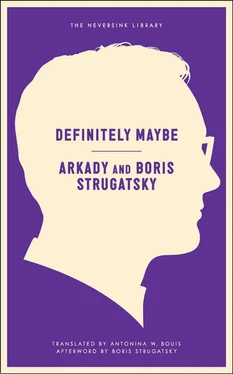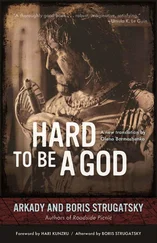“Has she been living here long?”
“She arrived yesterday.”
“Are her things here?”
“I don’t see any. And her coat is gone.”
“Strange, isn’t it?” Zykov said.
Malianov just waved his hand in silence.
“The hell with her. Women are nothing but trouble. Let’s have another shot.”
Suddenly the front door swung open, and in walked…
Excerpt 6…. elevator door, and the motor hummed. Malianov was alone.
He stood in the doorway to Bobchik’s room leaning on the frame and thinking about nothing. Kaliam appeared out of nowhere, walking past him, tail twitching, and went out onto the landing, where he set about licking the cement floor.
“Well, all right,” Malianov said finally, then tore himself away from the door frame and went into his room. It was smoke-filled and three blue glasses stood abandoned on the table—two empty and one half full. The sun was up to the bookshelves.
“He took the cognac with him! That’s all I need!”
He sat in the armchair for a while, finished his glass. Noises from the street came in through the window, and the open door let in children’s voices and elevator grumblings from the stairs. He got up, dragged himself through the foyer, bumping into the doorjamb, plodded out onto the landing, and stopped in front of Snegovoi’s apartment door. There was a big wax seal on the lock. He touched it gingerly with a fingertip and pulled his hand away. It was all true. Everything that had happened had really happened. Citizen of the Soviet Union Arnold Snegovoi, colonel and man of mystery, was no more.
Excerpt 7…. washed the glasses and put them away, cleaned up the pieces in Bobchik’s room, and gave Kaliam some fish. Then he took down Bobchik’s milk glass, put three raw eggs into it, added pieces of bread, heavily salted and peppered the mixture, and stirred. He wasn’t hungry; he was functioning on automatic pilot. And he ate the glop, standing by the balcony window watching the sun-flooded empty courtyard. Couldn’t they plant some trees? Even one?
His thoughts moved on in a feeble trickle, not really thoughts, just bits and pieces. Maybe these are the new investigative methods, he thought. The scientific and technological revolution and all that. Free and easy behavior and psychological attack. But the cognac, that was completely unclear. Igor Petrovich Zykov. Or was it Zykin? Well, anyway, that was what he said his name was, but what did it say in his documents? Those con men! he thought suddenly. They pulled that whole prank just for a lousy half bottle of cognac?
No, Snegovoi had died. That was clear. I’ll never see Snegovoi again. He was a good man, but disorganized. He always seemed out of sorts, particularly yesterday. And yet he was calling somebody; he wanted to say something, explain, warn about something. Malianov shuddered. He put the dirty glass in the sink. The embryo of the future pile of dirty dishes. Lidochka sure did a good job on the kitchen, everything sparkled. He warned me about Lidochka. Really, it was very strange about Lidochka.
Malianov rushed to the foyer and looked for Irina’s note. No, it was just his imagination. Everything was in order. It was obviously Irina’s handwriting and her style—and anyway, why would a killer stay around to do the dishes?
Excerpt 8…. Val’s phone was busy. Malianov hung up and stretched out on the sofa, his nose in the itchy blanket. Something was wrong at Val’s house, too. Some kind of hysteria. It’s happened before. A fight with Svetlana, or with his mother-in-law. What was that he asked me, something strange? Ah, Val, I should have your troubles! No, let him come over. He’s hysterical; I’m hysterical—maybe the two of us can come up with a solution. Malianov dialed again, and it was still busy. Damn, what a waste of time! I should be working, but there’s all this mess.
Suddenly he heard someone cough behind him in the foyer. Malianov flew off the sofa. For nothing, of course. There was no one in the foyer. Or in the bathroom. He checked the lock and came back to the sofa, whereupon he realized that his knees were wobbly. Hell, my nerves are shot. And that creep kept telling me that he was like the Invisible Man. You look like a tapeworm with glasses, you creep, not the Invisible Man! Bastard. He dialed Val’s number again, hung up, and began pulling on his socks with determination. I’ll call from Vecherovsky’s. It’s my own fault that I’m wasting time. He put on a fresh shirt, checked that his keys were in his pocket, locked the door, and ran up the stairs.
On the sixth floor a couple was making out by the incinerator chute. The guy was wearing sunglasses, but Malianov knew the punk—he was an aspiring do-nothing from Apartment 17. He was in his second year of unemployment and steadily not looking for work. He didn’t run into anyone else on his way to the eighth floor. But all the while he had the feeling that he would bump into someone. They would grab his arm and say softly: “Just a second, citizen.”
Thank God, Phil was home. And as usual he was dressed as if ready to leave for the Dutch Embassy for a reception for her Royal Highness, the car would be picking him up in five minutes. He was wearing a phenomenally gorgeous cream-colored suit, loafers beyond mere mortal dreams, and a tie. That tie always depressed Malianov. He just couldn’t understand how anyone could work at home in a tie.
“Are you working?” Malianov asked.
“As usual.”
“I won’t stay long.”
“Of course. Some coffee?”
“Wait. No, why not. Please.”
They went to the kitchen. Malianov took a chair, and Vecherovsky began the ritual with the coffee-making equipment.
“I’ll make Viennese coffee,” he said without turning.
“Fine,” Malianov said. “Do you have whipped cream?”
Vecherovsky did not reply. Malianov watched his protruding shoulder blades work under the creamy fabric.
“Did the criminal investigator come to see you?” Malianov asked.
The shoulder blades stopped for a second, and then the long, freckled face with the droopy nose and red eyebrows, raised high over the tortoiseshell eyeglasses, appeared slowly over his round, stooped shoulder.
“Sorry. What did you say?”
“I said: Did the criminal investigator come to see you today?”
“Why a criminal investigator?”
“Because Snegovoi shot himself. They’ve already talked to me.”
“Who’s Snegovoi?”
“You know, the guy who lives across the hall from me. The rocketry guy.”
“Oh.”
Vecherovsky turned away and his shoulder blades started up again.
“Didn’t you know him? I thought I had introduced you.”
“No,” said Vecherovsky. “Not as far as I can remember.”
A marvelous coffee aroma filled the kitchen. Malianov settled comfortably into the chair. Should he tell him or not? In that aromatic kitchen, cool despite the blinding sun, where everything was in its place and everything was of top quality—the best in the world or even better—the events of the last day seemed particularly crazy and improbable, even unhealthy, somehow.
“Do you know the joke about the two roosters?” Malianov asked.
“Two roosters? I know one about three roosters. A terrible joke.”
“No, no. It’s about two roosters,” Malianov said. “You don’t know it?”
And he told the joke about the two roosters. Vecherovsky did not react at all. One would have thought that he was faced with a serious problem instead of a joke—he was so serious and thoughtful when he set the cup of coffee and the creamer in front of Malianov. Then he poured himself a cup and sat down across the table, holding the cup in the air, taking a sip, and finally pronouncing:
Читать дальше












